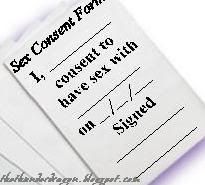 How much alcohol do you have to drink in order to be "incapable" of giving consent? 6 units? 10 units? 20, or even 50 units? Obviously it can't be decided based on the amount of alcohol a person has drunk. Different people react differently to different amounts of alcohol, different types of alcohol [for example, I don't do well on spirits - especially shots such as Aftershock - but I can drink lots of lager and be fine], the length of time in which the alcohol was drunk, and how much, what, and when you had eaten that day. Hence how can this idea work in practice?
How much alcohol do you have to drink in order to be "incapable" of giving consent? 6 units? 10 units? 20, or even 50 units? Obviously it can't be decided based on the amount of alcohol a person has drunk. Different people react differently to different amounts of alcohol, different types of alcohol [for example, I don't do well on spirits - especially shots such as Aftershock - but I can drink lots of lager and be fine], the length of time in which the alcohol was drunk, and how much, what, and when you had eaten that day. Hence how can this idea work in practice?
"A new white paper is expected to propose that judges should give far firmer guidance to juries in cases where there is a question over whether a woman claiming she was raped was capable of giving or withholding consent to sex.
If she was deemed so drunk she was incapable, the man would be far more likely to be convicted of rape.
The change would mark a significant departure from the current law, under which a man can escape conviction if he can convince the jury he believed a woman wanted sex, even if she was drunk.
The new law places a heavy responsibility on men to be certain women are sober enough to know what they are doing." (The Times)
How drunk do you have to be in order to be "incapable"? And how can you define "incapable" in the first place? What this idea is leading towards is that before intercourse taking place, the participants will have to sign a written contract that they consent - an idea patently absurd.
Of course rape is a serious crime and a horrible thing to happen to someone. But since only about 12% of rape cases
reach court and few of those get convictions, then this question must be asked: How many of the allegations of rape made (14,449 allegations of rape in 2005) are actually rape and not just regrets after a one night stand, with a the cry of rape used to make themselves feel better? Obviously I don't know the answer and I am not claiming that most rape cases are. But that fact remains, and it is a question to be asked - especially when large amounts of alcohol are involved, on
both sides.
Let's take an example: two people out on a night out clubbing meet up. They have both been drinking quite heavily, do some dancing, leave together, and then they go back to her place. They have both been drinking heavily, and the man believes that the woman consents to having sex - or at least she appears to consent through his drink-addled eyes. The next day she wakes up and decides that she must have been raped because she can't remember explicitly giving consent - but he believed she did. Has she been raped? We can't possibly answer that question. The woman may well have convinced herself that she did not, and the man has convinced himself that she did. Who is right? Both, and neither. He almost certainly didn't go out
intending to rape, and had she not consented to anything, she would not have let him into her home.
To say that because the man has no
proof that the woman gave consent to sex, it is thus rape is insane. To do that leaves all men who have one night stands wide open to false accusations of rape - and the possibility of conviction for a crime they do not believe happened. As the
Times article says: "The new law places a heavy responsibility on men to be certain women are sober enough to know what they are doing." But that does not prevent women for saying they weren't if they want to cry rape - and is putting the emphasis in the wrong direction. Instead, women should not put themselves in a position in which they are too drunk to be capable of giving or withholding consent for sex. Don't get so drunk that you can't do that.
Quite frankly, I am left with little sympathy for people who get that drunk - this doesn't mean I think that "they asked for it", however. I'm sure rape is a horrible thing. But this white paper is just leading towards a situation where sex can only occur when both parties whether sign a disclaimer or blood samples show that they are deemed "capable" to giving consent.
Source: The Times
 A millionaire convicted rapist was invited to a Labour Party fundraiser:
A millionaire convicted rapist was invited to a Labour Party fundraiser:



































